What do people see as the previous night's blurry memories come into focus? Is it visions of splashing around in a pool, with items of clothing precariously hanging off lounge chairs after being cast aside? Or is it something a little more regrettable, like stepping on their glasses as they drunkenly stumble around an unfamiliar room?
Parties. Alcohol. Drugs. They're a potent mix that can often lead to reckless, scandalous, or downright risky behavior. We surveyed over 1,000 Americans to find out which outrageous acts are the most common at social events, from concerts to sports games, and how people feel about their debauchery the morning after (and beyond). Read on to discover the good, the bad, and the ugly about our respondents' most reckless nights on the town.
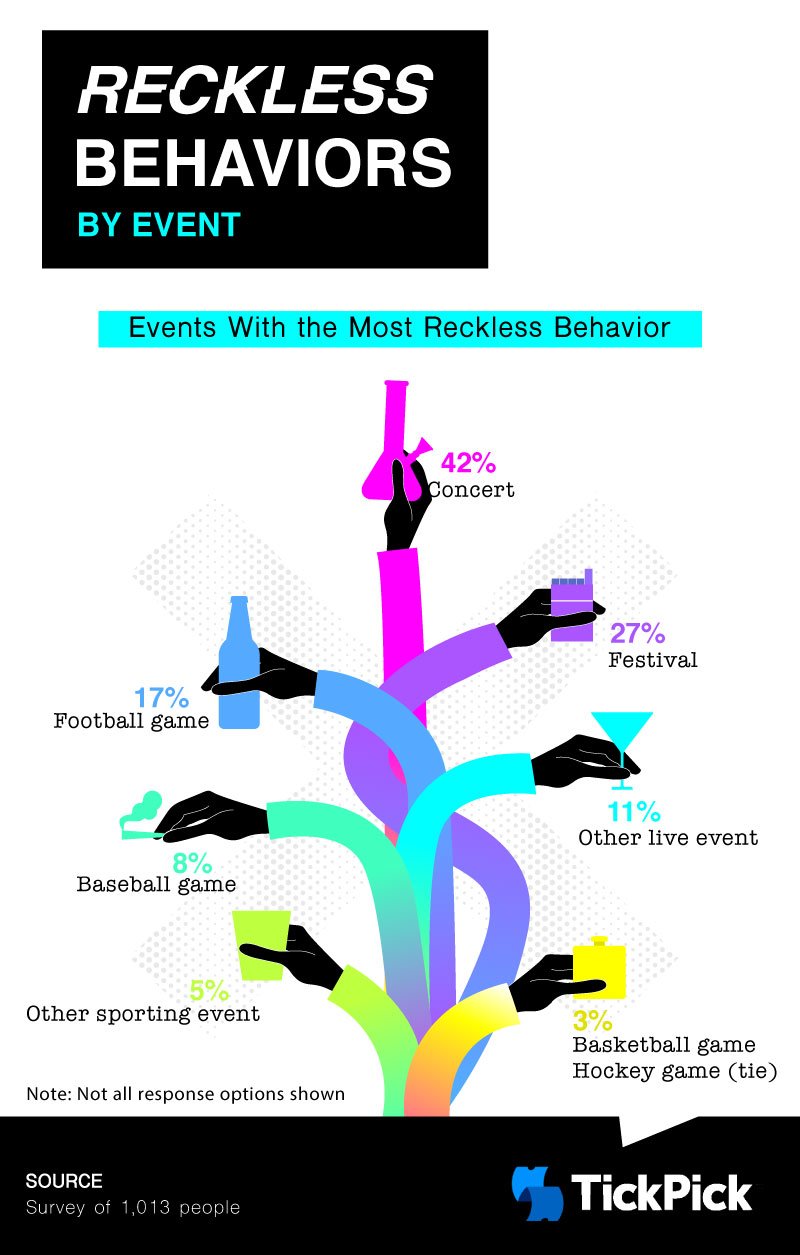
Most people aren't getting rowdy on their living room couch. Large events – and for our respondents, concerts in particular – are a huge draw for drugs and drinking culture, which can often lead to further debauchery. More than 40% of respondents said they had gotten reckless at a concert, followed by 27% who had done so at a festival. Seventeen percent had misbehaved at a football game, which was head and shoulders above other sporting events like hockey (3%) and baseball (8%) games.
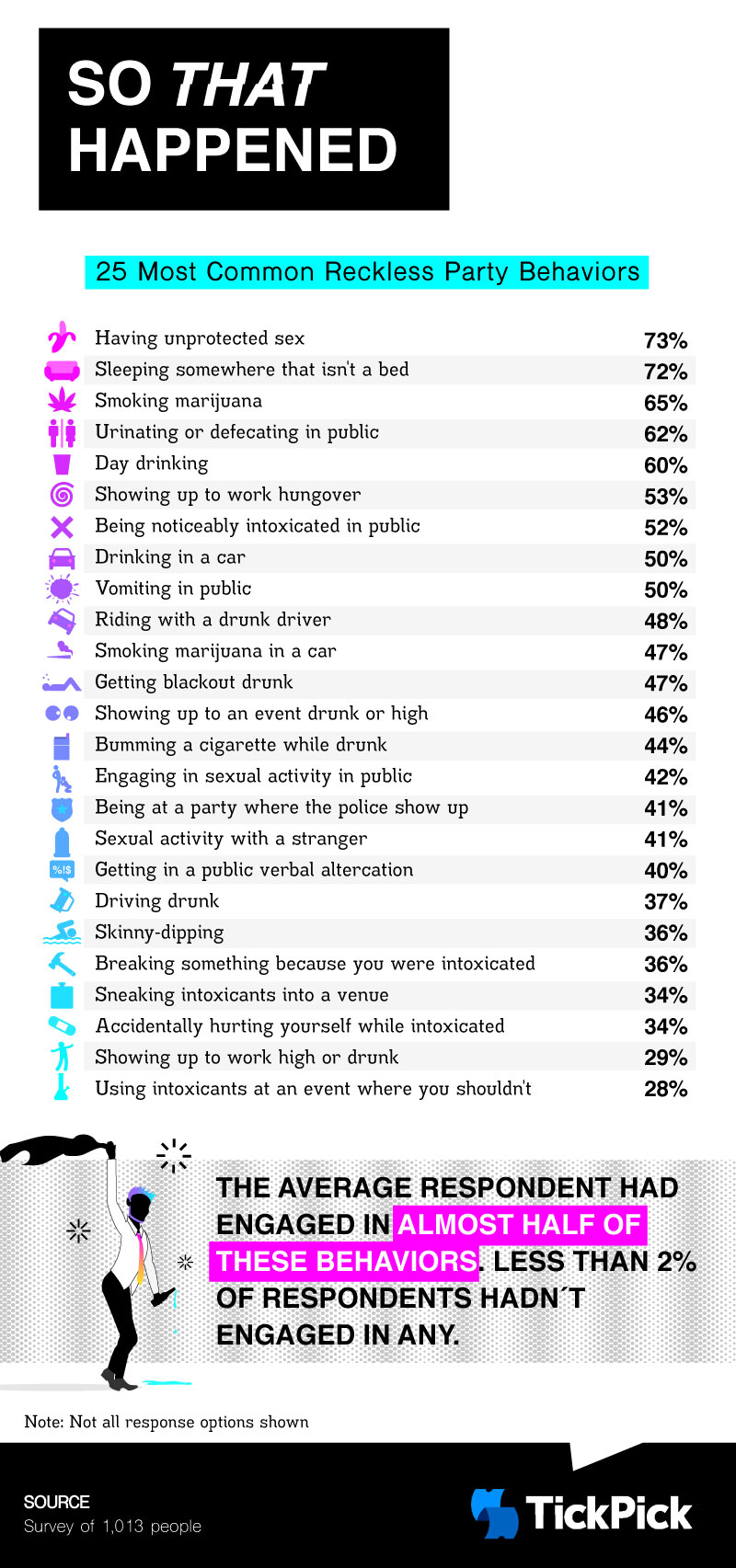
Reckless behavior can take on many forms, and sexual encounters were chief among them. Nearly
three-quarters of respondents said their debaucherous nights had included unprotected sex at one point
or another, and 42% had gotten frisky in a public place (an act that can earn you a misdemeanor charge in most states, so canoodle with caution!).
Another 41% said their  party hookup was a total stranger, and 36% have
stripped down to their
birthday suit for some skinny-dipping.
party hookup was a total stranger, and 36% have
stripped down to their
birthday suit for some skinny-dipping.
Half of all respondents said they had vomited in public, more than half had shown up to work the next day with a hangover, and a considerable 72% of people said they slept off their buzz somewhere that wasn't an actual bed. Maybe they chose to rack out on a park bench or a friend's pull-out couch for the evening instead? We may never know – because they might not remember!
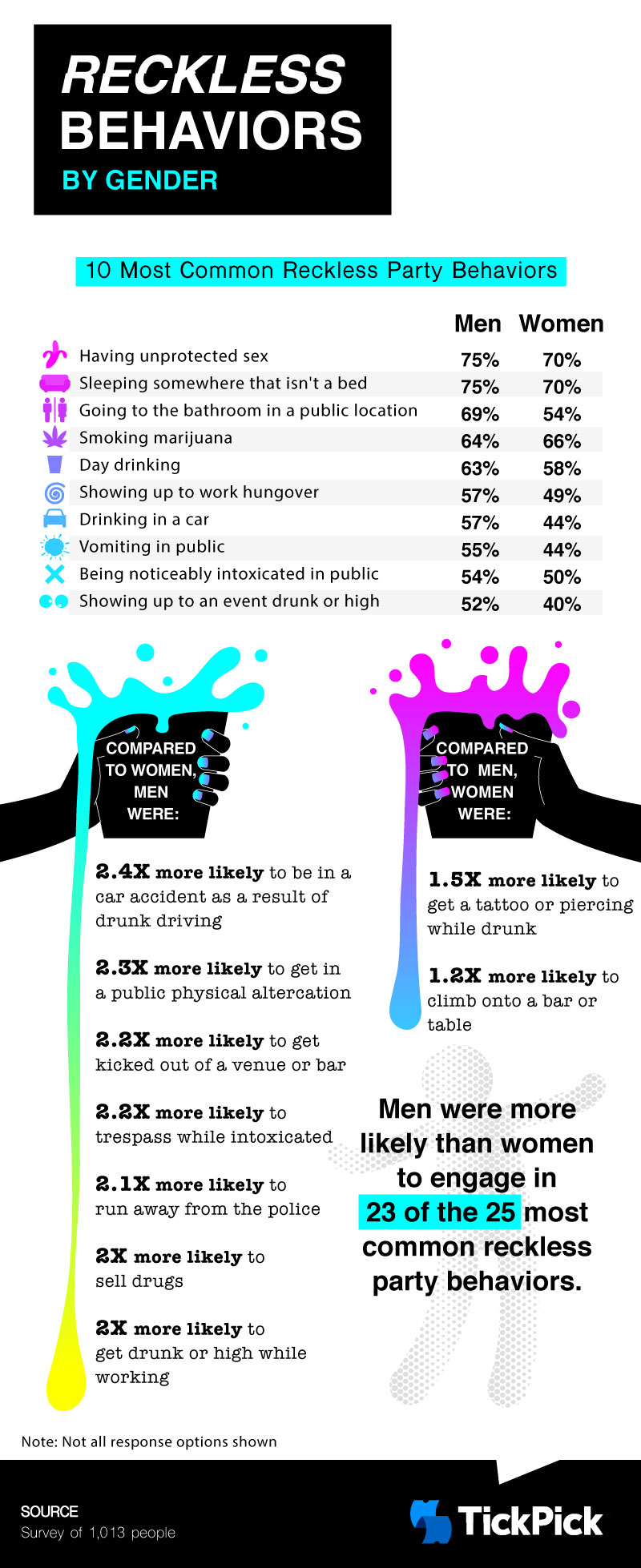
Though some studies have shown that there are no structural differences between the male and female brain, the sexes do tend toward different preferences and attributes in some areas of life. This was especially true when it came to acting recklessly, given that men were more likely to engage in a whopping 23 out of the 25 party behaviors on our list. The only two that were more popular among women were relatively tame: getting a tattoo or piercing while drunk, and climbing onto a bar or table (presumably to dance, or to belt out "Don't Stop Believing" during karaoke).
Men, on the other hand, slid into more dangerous territory. They were 2.4 times more likely to be involved in a car accident resulting from drunk driving and 2.3 times more apt to get into a physical altercation in public. Trespassing, getting kicked out of a bar, and running from the police were also far more common among men compared to women.
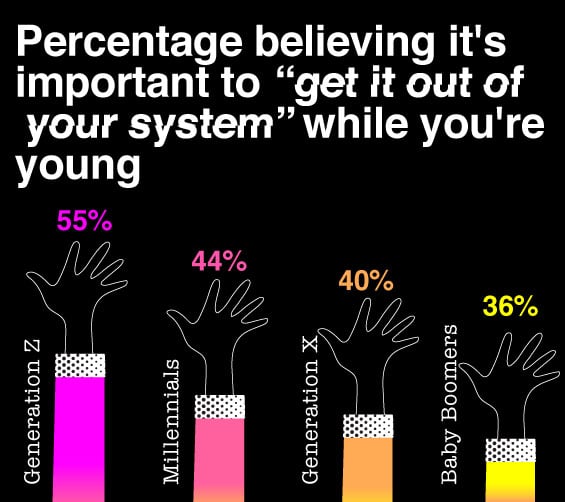
Our survey revealed a direct correlation between youth and thinking it's important to "get it out of your system" at a young age –"it" being any one of the scandalous behaviors discussed in this article. More than half of Gen Z respondents were on board with this train of thought, compared to 44% of millennials, 40% of Gen Xers, and just 36% of baby boomers.
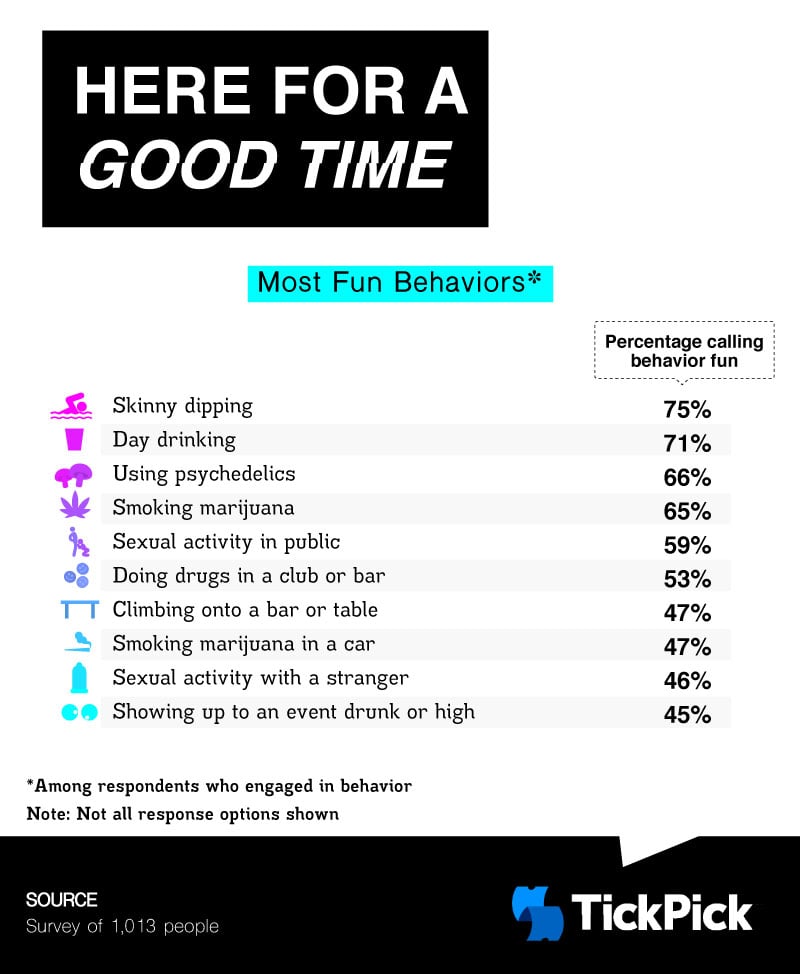
What is "fun," anyway? For some people, it's reading a good book while swaddled in a cocoon of blankets. For others, it's skinny-dipping in your friend's pool. Three-quarters of respondents who had taken a dip in their birthday suit said they had fun while doing it, and 71% of day drinkers felt the same (bottomless mimosas at brunch, anyone?). Using psychedelic drugs and marijuana were also considered fun by our respondents' standards (particularly doing drugs in a club and smoking pot inside a car).
While it can be easy to scoff at reckless fun, "play" itself is extremely important for adults' mental health. Activities like interacting with your dog, playing chess, and laughing can relieve stress, sharpen the mind, and improve one's connection to others. So, if skinny-dipping isn't your thing, pick up a board game to indulge in some fun. And if it is, more power to you!
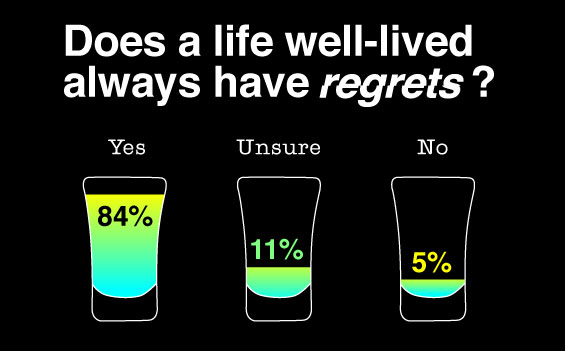
Regret. It's a feeling that can turn the stomach and overwhelm the mind. But what if we could flip the script on regret, turning it into a badge of honor instead of a ghost of shame or embarrassment? A hefty 84% of respondents believed a life well-lived would always be dotted with regret, compared to just 5% who disagreed. Another 11% were unsure of how they felt about regret.
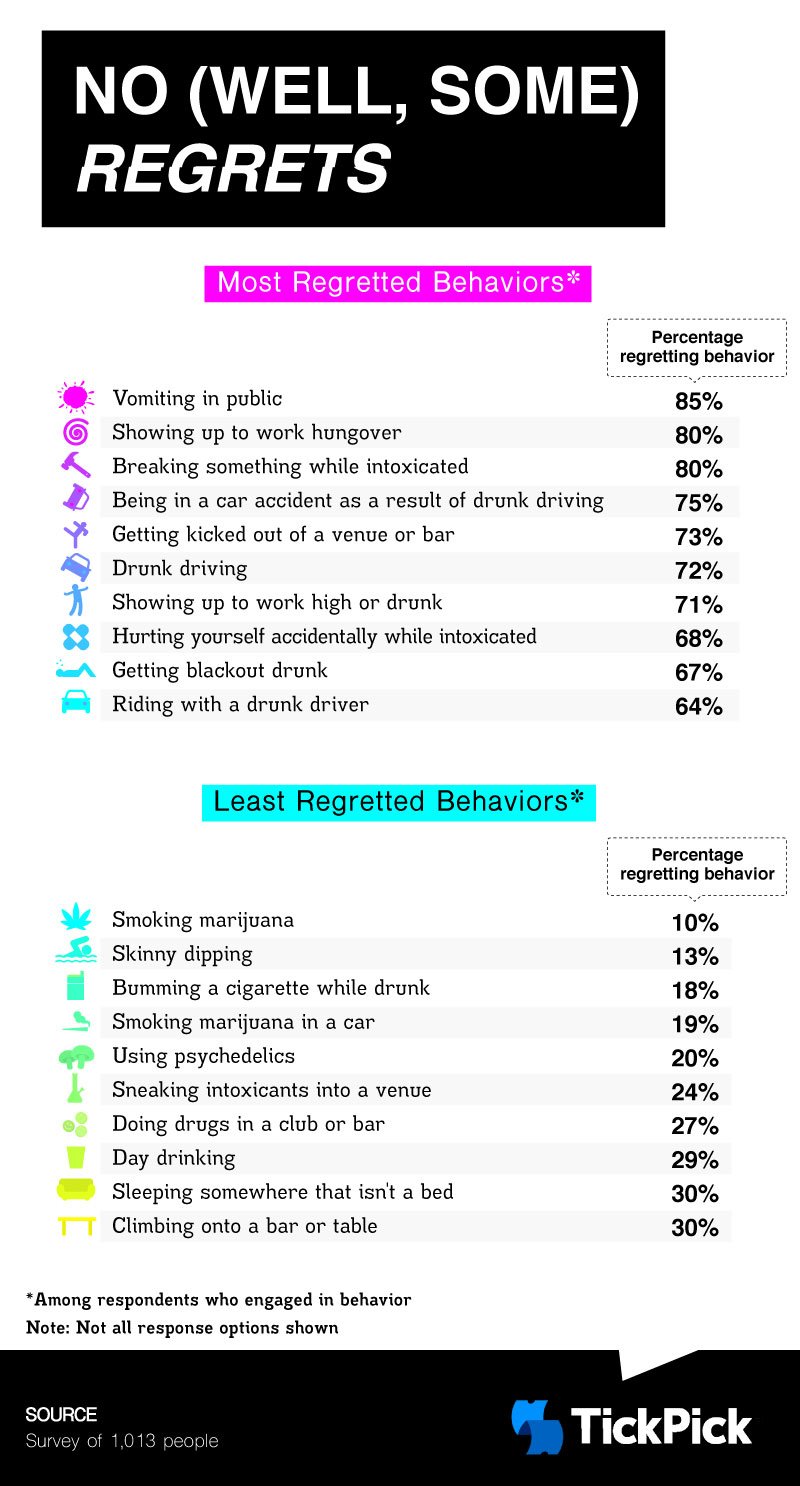
So, which behaviors were most frequently filed away as evidence of a life well-lived? Our respondents'
most-regretted behavior was the relatively innocuous act of vomiting in public, with 85% having
expressed remorse. Shockingly enough, drunk driving took sixth place on the most-regretted behaviors
list (72%), below far less  dangerous occurrences like breaking something
while intoxicated and getting
kicked out of a bar. Another 75% said they regretted getting into an accident as a result of drunk
driving. Smoking pot was the least regretted act of all, followed by skinny-dipping and bumming a
cigarette while drunk.
dangerous occurrences like breaking something
while intoxicated and getting
kicked out of a bar. Another 75% said they regretted getting into an accident as a result of drunk
driving. Smoking pot was the least regretted act of all, followed by skinny-dipping and bumming a
cigarette while drunk.
It goes without saying that driving under the influence, or getting into a car with someone who is under the influence, is a choice that's deadly serious. In 2016, just shy of 10,500 Americans died in alcohol-related driving accidents, accounting for 28% of all traffic-related fatalities. Next time you're out, call a cab or a ride-hailing service instead – that way, you'll be able to wake up safe and sound the next morning to reminisce about all of your sillier, more lighthearted regrets.
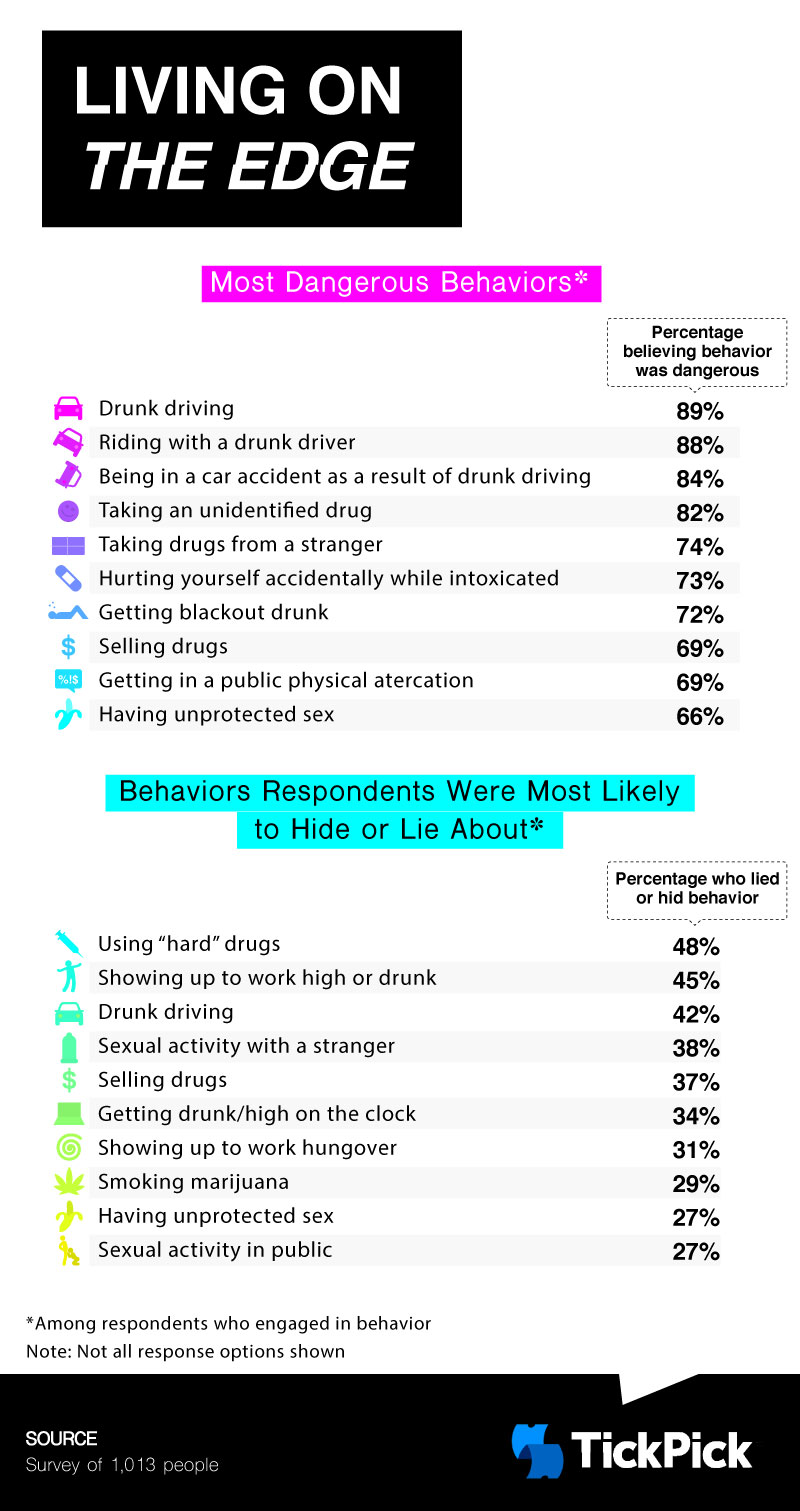
We've all done things we're not entirely proud of, like faking sick to skip out on a test at school or getting frustrated with someone who didn't deserve it. But how many of our respondents had done something reckless that could also be considered genuinely dangerous?
The three behaviors most commonly viewed as dangerous had to do with drunk driving, as confirmed by 89%
of people who had driven under the influence, 88% who had ridden with a drunk driver, and 84% who had
been in an alcohol-related car accident. Taking an unidentified drug or taking drugs from a stranger
were also deemed
dangerous by roughly three-quarters of people who had done so.
also deemed
dangerous by roughly three-quarters of people who had done so.
The risk in accepting drugs from a source you don't know or trust lies in the fact that they can be cut with harmful substances: For example, cocaine is sometimes laced with cheaper stimulants or fillers that can increase your chances of becoming addicted or sick.
Nearly half of respondents who had taken hard drugs said they had hidden or lied about their behavior. Another 45% of people who had shown up to work drunk or high tried to hide it, likely in fear of getting fired. Other commonly concealed behaviors were drunk driving, having sex with a stranger, and getting drunk or high while on the clock.
Being just a little impulsive in a party atmosphere is, for most people, simply a part of letting loose. However, there are many varying degrees and shades of recklessness, from the ultra-dangerous (like driving while intoxicated) to the largely harmless (like skinny-dipping). Overall, men were far more likely to engage in careless behavior than women, and the grand majority of respondents agreed that having regrets is the mark of a life well-lived. Concerts were particularly conducive to inspiring risky behavior, as were festivals and football games.
TickPick is all about giving you access to your favorite sports games, plays, and concerts – just remember to keep the recklessness in check while you enjoy the show! Visit our site to browse events near you and snag tickets at great prices. You can even place a bid for a lower amount, or assess the value you're getting based on our letter grading system. Check out tickpick.com for more info.
We surveyed 1,013 people using the Amazon MTurk service. 509 respondents were female, 500 were male, and four did not identify as male or female. Respondents ranged in age from 18 to 88 with an average age of approximately 37.5. To ensure that respondents were taking our survey seriously, all respondents were required to identify and correctly answer two separate attention-check questions. Our margin of error is 3% with a 95% confidence interval.
In some cases, not all response options were shown. In many cases, questions and responses have been rephrased for clarity or brevity. To help ensure statistical accuracy, outliers have been removed where appropriate. These data rely on self-reporting, and strict statistical testing has not been performed. Potential issues with self-reported data include, but are not limited to: exaggeration, selective memory, and attribution errors on the part of respondents.
Sure, going skinny-dipping is a little reckless – but have you ever shared content without linking back to the full story? Don't live a life of regret: Do the right thing when sharing this story for noncommercial purposes and provide a link to this article whenever you do so.